India Interest Rates Scenario Part1
Interest-Rates / India May 17, 2010 - 06:24 AM GMTBy: Dhaval_Shah
 If you are thinking Interest Rates(IR) would not go up? Think twice.
If you are thinking Interest Rates(IR) would not go up? Think twice.
All major inflationary forces acting like windstorm swiping the world and pouring debt(currency printing ) across the world first to bail out corporate than to taxpayers and now to nations and in last stage probably to entire world seems like windstorm & rainstorm are converging to category 5 Hurricane Katrina.
India Interest Rate Scenario
Why do I believe IR would go up?
1. Massive inflation across the sectors and categories in India. High prices of Oil.
2. Massive Govt. Spending
3. Gargantuan liabilities of Govt, which requires Govt to borrow 30% of GDP every year thus pumping enormous money supply in the economy, which coupled with Fractional Reserve Banking multiplies and floods the economy with cheap currency.
This ends in currency loosing purchasing power and inflation swiping the nation.
4. Monsoon effect. We had worst monsoon post 1972 in 2009. Met dept forecasts normal monsoon in 2010. But, it still remains worry.
Inflation
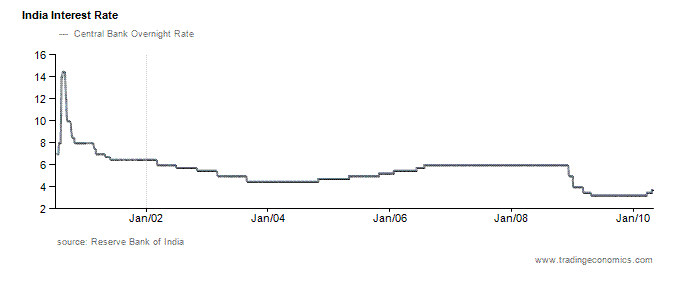
Look closely at above chart. In year 2000 interest rates had reached to as high as 15.5% in India. Yes, not corporate or multinational, this was the rate of borrowing for Banks from RBI.
On 10th July, 2000, Interest rate was mere 7% and on 9th Aug 2000, in less than a month, it climbed full 8.5%…..yes whopping 8.5% in less than a month to 15.5%.
We will examine causes later. But, keep in mind that when things get worse, central bank has to resort to use this last and final tool of jacking up rates as fast as possible to rein in the situation.
Chart also demonstrates very clearly that interest rates have completely bottomed out now and ready to march upwards.
Question is not only, how high rates would go? But how hasty would it go up?
Inflation
To answer both of these questions, let us review RBI’s annual policy statement for 2010-11 published on 19th April.
RBI governor looked much concerned about Inflation and got reflected at every other line of policy statement.
Here are some excerpts
“ Though inflation has started rising in several EMEs, India is a significant outlier with inflation rates much higher than in other EMEs.
Going forward, three major uncertainties cloud the outlook for inflation. First, the prospects of the monsoon in 2010-11 are not yet clear. Second, crude prices continue to be volatile. Third, there is evidence of demand side pressures building up. ”
Here, In very soft and polite language Governor Dr. D. Subbarao expressed his concerns.
Govt Borrowing
These concerns have erupted from below chart!!!!!
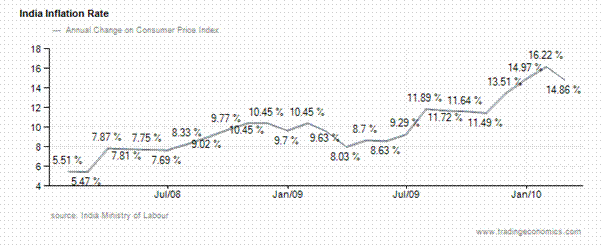
Look, How hastily Inflation has gone up? It has doubled in less than a year.
Here, Mr. Subbarao explained causes of concerning inflation…
“Clearly, WPI inflation is no longer driven by supply side factors alone. The contribution of non-food items to overall WPI inflation, which was negative at (-) 0.4 per cent in November 2009 rose sharply to 53.3 per cent by March 2010. Consumer price index (CPI) based measures of inflation were in the range of 14.9-16.9 per cent in January/February 2010. Thus, inflationary pressures have accentuated since the Third Quarter Review in January 2010. What was initially a process driven by food prices has now become more generalised. ”
But, think twice, Is inflation only worry? Heck no.
Govt Borrowing
The biggest worry is Govt. Borrowing program. RBI Governor has not shied away to express his resentment on massive govt borrowing program.
Finance Ministry is to borrow 36% more this year form market compared to last year. If I put it into figure, Govt is set to borrow Rs. 3,89,300 crore and add borrowing by state govts…..
Put together, RBI has to facilitate borrowing of close to Rs. 5,97,414 crore without affecting interest rates in year 2010!!!!?????


In current Fiscal, combined expenditure of the centre and states pegged at Rs. 18,92,880 crore.
Govt is set to borrow Rs. 5,97,414 crore from markets and would spend Rs. 3,30,389 crore, from expected fiscal revenue, towards paying interest on earlier borrowings. Remeber, only interest not principal.
Put together, Rs. 9,27,803 crore will be spent in the economy, which is either borrowed money or goes towards repaying interest .
It is colossal 50% of budgeted expenditure, funds which Govt does not own and has to repay with Interests.
This insane spending places India in very high Budget Deficit category of nations with Gross Budget Deficit at close to 11.5%
Data is taken from RBI. Click to view in detail.
http://investmentacademy.files.wordpress.com/2010/05/current-statistics.pdf
Those, who want to know our Govt’s Fiscal situation, refer to my Fiscal Disaster article. Link: http://investmentacademy.wordpress.com/2010/01/28/fiscal-disaster/
Meanwhile, Total Liabilities of the Centre and States [ includes internal and external debt, small savings schemes and provident fund liabilities] has reached to close to Rs. 50,00,000 crore. Yes, you read it right, FIFTY LACS CRORE. Close to 90% of GDP.
And, this does not include off balance sheet liabilities.
RBI Statement on Govt Borrowing program
“ Historically, fiscal deficits have been financed by a combination of market borrowings and other sources. However, in 2009-10 and 2010-11, reliance on market borrowings for financing the fiscal deficit increased in relative terms. The large market borrowing in 2009-10 was facilitated by
the unwinding of MSS securities and OMO purchases, as a result of which fresh issuance of securities constituted 63.0 per cent of the total budgeted market borrowings.
However in 2010-11, almost the entire budgeted borrowings will be funded by fresh issuance of securities. Therefore, notwithstanding the lower budgeted net borrowings, fresh issuance of securities in 2010-11 will be Rs.3,42,300 crore, higher than the corresponding figure of Rs.2,51,000 crore last year. The large government borrowing in 2009-10 was also facilitated by sluggish private credit demand and comfortable liquidity conditions. However, going forward, private credit demand is expected to pick up further.
Meanwhile, inflationary pressures have also made it imperative for the Reserve Bank to absorb surplus liquidity from the system. Thus, managing the borrowings of the Government during 2010-11 will be a bigger challenge than it was last year.”
Have these concerns started reflecting in Bond Market?
Yes, look at the below chart.
Dotcom bubble crisis in year 2000 swung the rates high close to 12% and later in year 2001, after 9/11, central banks of the world slashed the rates to jump start the economy.
Similar instance was seen in year 2008, first rates went up sharply and later dived to halt the economic decline.
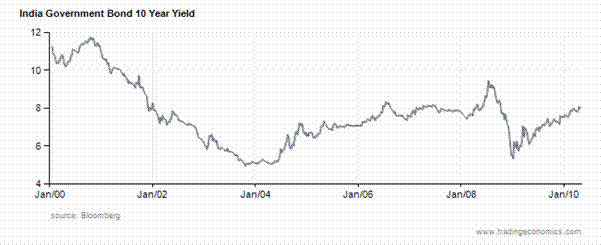
Wouldn’t this time situation be similar and rates would remain at bottom for longer period?
NO, because never ever in History, Debts and Liabilities of the nations have reached to patently unpayable level.
Instance: US has accumulated Public Debt to the tune of $ 127.8 tn. Yes, you read it right. It is 10 times of GDP. Situaltion is either simiar and in some cases even worst than US in Europe.
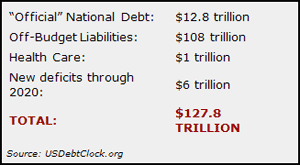
What is different this time, that is driving interest rates high??
1. Accumulation of gargantuan debt and liabilities by Govts, which is becoming patently unpayable even 10 yrs down the line
2. Massive borrowing by central Govts across the world
3. Massive money printing by central banks across the world.
Instance:
For US central bank, It took 100 years to expand the monetary base to $850bn and in last short 18 months, it climbed to $2.1 trn. i.e Fed created new money worth $1.25 trn out of thin air, more than 250% new money to what it was 18 months before
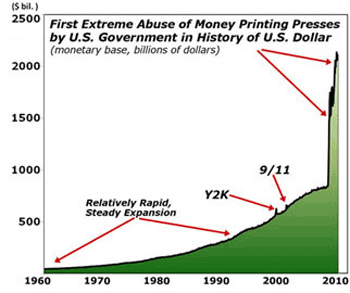
That’s an irresponsible, irrational and insane increase of 2.5 times in just 18 months — and you must not underestimate its sweeping historical significance.
There is no historical precedence to compare such a massive printing.
Same and probably worse is the situation across the Europe.
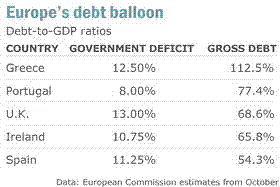
Last year, Budget deficits of European nations zoomed past 10%, which is considered as red mark.
Debt to GDP
Of late, you have been frequently listening about debt to GDP ratio.
What money managers and creditors closely look at is Debt to GDP ratio of nation to decide the risk of lending.
Ratio includes 2 factors. Debt and GDP.
In 2008, GDP did not fall much as effects were yet to be felt in real economy. But, to stem the fall, Govt spent heck lot of money in 2008, mostly assuming that if GDP remains stable, this debt is payable.
But, in 2009, real economies dived miserably. US decline -2.4% to Russia as high as -7.90%.
| Country | Real GDP % est 2009 |
| US | -2.4 |
| Euro Zone | -4.0 |
| Germany | -5.0 |
| France | -2.1 |
| England | -4.3 |
| Russia | -7.90 |
| Japan | -5.70 |
| India | +6.50 |
| China | +8.70 |
| World | - 1.0 |
When GDP fell, Debt to GDP ratio got ugly.
Example: say country’s Debt was Rs. 70 and GDP was Rs. 100. Hence, Debt to GDP ratio comes at 70%, fine.
Now, GDP falls by 5%, so 95 and Debt remains at same level that will drive Debt to GDP ratio higher at 74%.
And, what if next year again GDP falls by 5%, and debt increases by 5%, that drives ratio to 81%.
10% increase in Debt to GDP ratio in 2 years and do not forget, Govt has to keep paying interest on debt which it has been piling up since decades to gather.
This is what precisely happening with Greece, Portugal, Ireland, Italy and Spain.
These nations GDP has been falling since last 2 years, official unemployment rate has reached as high 20% to 25%, banks are in huge losses due to their sub prime exposure and participation in interest rate derivatives.
Put all these factors combined with inflation, creditors are scared to lend money to these nations because their repaying capacity is becoming dismal.
I have also presented table for you of G-20’s Debt to GDP ratio.
Look at G-20 situation
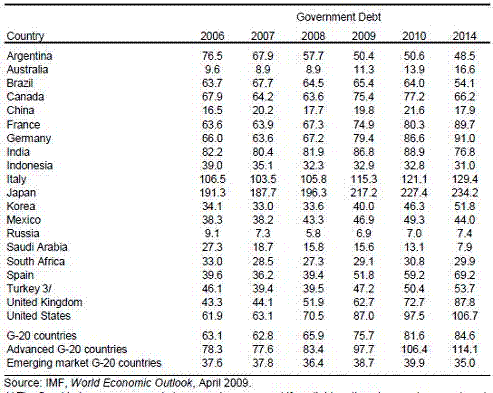
Above data is upto April 2009. Govts have piled up huge debts after that. That means, ratios are more uglier than it looks into table.
Some Market Reactions:
Warning from Finance Secretary
Bond yields near 18-month high on inflation concern
4 May 2010, 0201 hrs IST,ET Bureau
The benchmark 10-year bonds declined, pushing yields to near an 18-month peak, after finance secretary Ashok Chawla said inflation at current levels is high.
The yield rose as in vestors also speculated there will be fewer trades in the existing note after the central bank on April 30 sold a new 10-year bond, according to Devendra Das, a debt trader at Development Credit Bank. Chawla said inflation, which at current levels is not “socially, economically or politically acceptable,” may cool by the end of 2010
Corporates are busy raising money before rate hikes
Corporates hit Bond Street ahead of rate hikes
3 May 2010, 0447 hrs IST,ET Bureau
MUMBAI: A host of state-owned and private corporates are expected to raise funds through fresh debt offerings in the coming days as they try to make
the best of the recent fall in bond yields, ahead of a possible interest rate hike. Dealers say IDFC, HDFC, Exim Bank, Power Finance Corporation, RIL and IRFC are some of the companies that may hit the bond street as early as next week. For close to a month before the April monetary policy review, there were hardly any large issuances.
This flurry of issuances comes in the backdrop of events in Europe hurting appetite for debt of emerging market economies like India. Companies have so far countered this by selling their bonds in the local market. For instance, HDFC, Reliance Power and Utilities, L&T Infra, Nabard, Shriram City Union Finance, SAIL, BPCL and IFCI are some of the companies that have raised around Rs 6,000 crore in the past ten days. This trend could gain steam in May, dealers said.
Hence, It does not leave any doubt that Interest Rates across the world are set to go up.
Global Perspective
You may think why rates would go up in India? Broadly, it looks developed nations problem. We are still growing at healthy 7-8%. Growth in GDP nos must help us to contain the contagion.
Answer is Why Indian market tumbled in 2008? Housing crisis had not originated in India neither our banks were exposed to sub prime or derivatives.
We tumbled along with world markets because we are part of Globalised world. Decoupling is a mere assumption far from reality.
Our markets fell more than rest of the world in 2008, RBI also joined race to reduce benchmark banking rates with central banks of the world , our markets recovered in 2009 along with world markets.
None of the last 2 years events exhibits that we can sing a solo economic tune.
And, do not forget out own garguntunan liabilities, that has reached 90% of GDP.
For world, borrowing is getting costlier and same will reflect in our bond prices, too, soon.
Hence, be prepared.
Regards
Dhaval Shah
Blog: Http://investmentacademy.wordpress.com
© 2010 Copyright Dhaval Shah - All Rights Reserved
Disclaimer: The above is a matter of opinion provided for general information purposes only and is not intended as investment advice. Information and analysis above are derived from sources and utilising methods believed to be reliable, but we cannot accept responsibility for any losses you may incur as a result of this analysis. Individuals should consult with their personal financial advisors.
© 2005-2022 http://www.MarketOracle.co.uk - The Market Oracle is a FREE Daily Financial Markets Analysis & Forecasting online publication.



